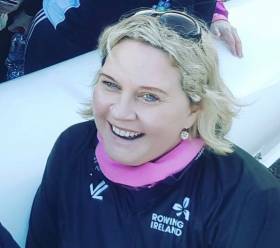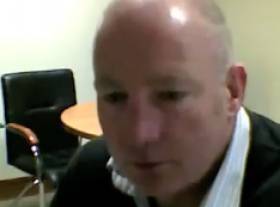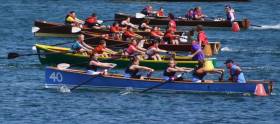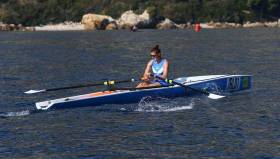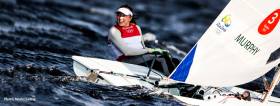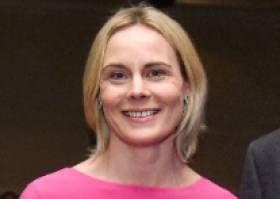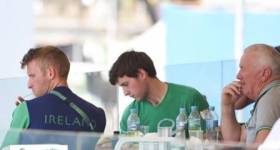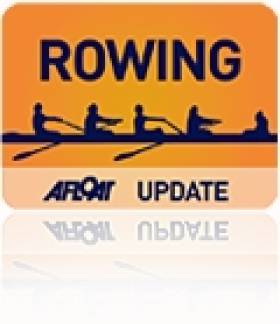Displaying items by tag: Rowing Ireland
Carpenter to be First Woman CEO of Rowing Ireland
#Rowing: Michelle Carpenter has been chosen as the new chief executive of Rowing Ireland. She will succeed Hamish Adams who recently left the position to take up the role of CEO with Athletics Ireland.
Carpenter has held a number of significant management positions during her career, including overseeing the development and management of the successful Get Going…Get Rowing programme.
In her early corporate career, Michelle spent eight years working in Europe, firstly at the Council of Europe, Strasbourg, before moving to European Central Bank in Frankfurt in 1999 to be part of the Euro 2002 information campaign.
Originally from Limerick, Michelle was one of the first registered female rowing members of Shannon Rowing Club, rowing in their first winning women’s championship crew of 1988.
Carpenter is currently working with the World Rowing development team on the Olympic Values Education programme. In 2017 she was selected by World Rowing to be a participant at the IOC Women in Leadership forum in Lausanne.
Commenting on her new role, Carpenter said: “I am honoured to be appointed as CEO of Rowing Ireland it is an exciting time for our sport. Having been involved in Irish rowing for over 30 years, I am looking forward to contributing to the growth and success of the sport across Ireland in the future.
“I am passionate about our sport and supporting our clubs and volunteers for the future will be key to our organisation’s development, together with underpinning our successful High Performance, Get Going…Get Rowing and Coach Education programmes.
“2018 will be a very exciting year for Rowing Ireland with our international ‘Festival of Rowing’ commencing in July with the Irish Championships, leading into the Home Internationals and finishing with the prestigious Coupe de la Jeunesse.”
Commenting on the new appointment, President of Rowing Ireland, Eamonn Colclough said: “Michelle has emerged from the extremely robust and intensive recruitment process which we conducted to source the best possible candidate. I congratulate her, the first woman to be appointed to the demanding role of CEO of Rowing Ireland. I am confident that she will build on the success we have enjoyed in recent years and provide dynamic leadership to drive further growth and success in the years to come.”
Adams Leaves Rowing Ireland to Head up Athletics Ireland
#Rowing: Rowing Ireland chief executive Hamish Adams is to leave his post to take over as chief executive of Athletics Ireland in May.
Adams had done the job for five years, arriving after a time of disruption and steadying the ship. The sport expanded domestically and was very successful on the international stage. The New Zealander had been a rugby player and the academy manager of Munster Rugby. He took over the rowing post after serving as acting chief executive and then player services advisor with the Irish Rugby Union Players Association.
Eamonn Colclough, the president of Rowing Ireland, said: “Hamish has worked tirelessly for our organisation and has delivered incredible success across all our strategic areas. Since joining Rowing Ireland, Hamish has been responsible for overseeing organisational change which has seen Rowing Ireland become one of Ireland’s most eminent sporting bodies. We are committed to ensuring further success for all our stakeholders and we will now undertake a robust recruitment process to find a suitable replacement for Hamish.”
Adams said: “While sorry to be leaving Rowing Ireland after five great years with the many great people I’ve had the privilege of working with and for, I’m excited by the new opportunity and challenge of leading Athletics Ireland. I am very proud of all that we have achieved during my tenure both in high performance and participation, from the delivery of an Olympic medal to the establishment of the Get Going…Get Rowing programme and I am confident that with the robust governance structures established, Rowing Ireland will continue to deliver further success.”
New Coastal Rowing Championships to be Hosted by Rushbrooke
#Rowing: Rushbrooke Rowing Club from Cobh will host the Irish Coastal Rowing Championships next August. It is the first such coastal event to be held under the auspices of Rowing Ireland.
The decision to choose Rushbrooke was made at the inaugural annual delegate meeting of the new Rowing Ireland Coastal Rowing Division in Portlaoise.
Rushbrooke submitted a detailed proposal to hold the championships at the National Rowing Centre in Cork and were given unanimous support. Delegates opted for the weekend of August 18th and 19th for the event.
Ted McSweeney, the chairperson of Rushbrooke Rowing Club said: “This is the greatest honour to be bestowed upon our club. Our club has been in existence since the early 1900s, and although the original club ceased in the late 1960s when the original wooden clubhouse and boats were engulfed by a fire, in 1989, local residents decided to restart the club and agreed on using the Yawl class racing boat. Over the last 28 years, we have gone from strength to strength and have established ourselves as one of the top coastal rowing clubs in Cork.
“As a club, we are delighted at the opportunity to host the inaugural Irish Coastal Rowing Championship and will endeavour to deliver an event that will meet the superb standards that have been set over the past few years. Even at this early stage, we have received immense support, both from the Coastal Rowing community and local organisations. We would like especially to thank the management team at the National Rowing Centre in Farran Woods, who have been exceptionally helpful and forthcoming in assisting us with our bid. A new chapter in coastal rowing has begun and Rushbrooke Rowing Club will strive to maintain the high standard of regattas that we have been accustomed to. We look forward to welcoming all Coastal Rowers to Cork in 2018 and we can assure you of a Ceád Míle Fáilte.’
Kieran Kerr, chairperson of the Rowing Ireland Coastal Division, said: “On behalf of Rowing Ireland, I would like to congratulate Rushbrooke Rowing Club on a very professional bid. We look forward to an exciting inaugural Irish Coastal Rowing Championships.”
Rowing Ireland to Run Coastal Rowing Championships
#Rowing: There is to be a new Coastal Division of Rowing Ireland. At a meeting of the RI board on Saturday, October 21st, the board unanimously acceded to a request from 20 of its affiliated clubs that it form a coastal division. Rowing Ireland has traditionally offered river (Olympic) rowing, and since May of this year has also offered offshore rowing.
Hamish Adams, Rowing Ireland CEO, said: “Having seen how successfully offshore rowing has been integrated into Rowing Ireland we believe that adding coastal rowing is a very positive step to expand our product offering and will permit Rowing Ireland to recruit members and develop rowing where river rowing is not possible.”
Rowing Ireland will run an Irish Coastal Rowing Championship in 2018, the venue and date of which will be agreed by the clubs at a later date. Kieran Kerr, the chair of the new Coastal Rowing Committee, said that the new coastal division will be club driven and will endeavour to raise the standard of coastal rowing through the provision of coach education and all the other services which Rowing Ireland provides.
Sailing & Rowing Get Sport Ireland Funding Boost As Rio Review Says Ireland Falls Short
#Tokyo2020 - Funding for Irish sailing and other watersports remains broadly unchanged in Sport Ireland’s allocations for National Governing Bodies in 2017 — though programmes encouraging women in rowing have received a boost.
However, the accompanying review of the Irish Olympic performance in Rio acknowledges that Ireland's medal target was not reached – raising questions of expectations for Tokyo 2020.
The report highlights that Ireland “does not fund sport seriously”, according to Irish Times sportswriter Johnny Watterson, who cites the absence of long-term funding in favour of annual, non-guaranteed allocations.
More than €20 million for sporting bodies and athletes, in line with last year’s allocations, was announced by Minister of State for Sport Patrick O’Donovan this week as Sport Ireland also published its review of the 2016 Olympic Games in Rio.
The 2017 investment comprises €1.8 million in direct athlete investment; €7.2 million in high performance programme funding; €10.8 million in National Governing Bodies core funding; and €600,000 for the Women in Sport Programme.
The Irish Sailing Association (€323k), Rowing Ireland (€210k), Irish Surfing Association (€65k) and Irish Underwater Council (€60k) will get sums unchanged from 2016, though Canoeing Ireland sees a cut in its allocation by €10,000 (€205k to €195k).
Sailing (€18k) and surfing (€7,000) also see unchanged sums for their Women in Sport programmes, but Rowing Ireland receives a boost to €45,000 from €35,000 in 2016.
Sport Ireland highlights that more than 15,000 women and girls participated in Rowing Ireland’s ‘Get Going Get Rowing’ programme last year, while over 300 took part in the Irish Surfing Women in Sport initiative, and more than 9,000 availed of the Swim Ireland programme for female participation.
In allocations for high performance programmes, the ISA’s share rises by €100,000 to €735,000 for 2017, while Rowing Ireland sees an even bigger boost in its HP grant from €400,000 last year to €525,000.
Canoeing Ireland, however, sees its HP allocation cut by almost 40% to from €65,000 €40,000.
Welcoming the increase in sailing investment, ISA high performance director James O’Callaghan called for perspective on the figures involved.
“We’re pleased with the €100,000 increase but the truth of the matter is we started off the year with a €60,000 deficit because of the cost of [competing in] Rio. So really, it’s status quo for sailing,” he said.
Athlete investment
In direct athlete investment, 16 international athletes are awarded ‘Podium’ funding for 2017 under the International Carding Scheme.
In rowing, Rio Olympic medallists Gary and Paul O’Donovan, along with Sanita Puspure, will each receive €40,000 in Podium funding, while Rio’s Laser silver medallist Annalise Murphy is the only sailor to qualify for that funding level.
Sinead Lynch, Claire Lambe (€20k each), Mark O’Donovan, Shane O’Driscoll and Denise Walsh (€12k each) round out the rowing recipients in the 2017 funding round.
Among other sailing recipients, Ryan Seaton and Matt McGovern each receive €20,000, Finn Lynch gets €12,000 and €16,000 goes to crew/transition athletes.
In canoeing and kayaking, Patrick O’Leary (para canoe), Tom Brennan, Liam Jegou, Jenny Egan and Michael Fitzsimon will each get €12,000 of International level funding.
Sailing ‘must diversify’
Meanwhile, Sport Ireland says its Rio Review provides a “blueprint” for campaigns heading into the Tokyo Olympics in 2020.
In sailing, two of Ireland’s four classes competed in Rio “performed at or near expectations”, with the others cites for “credible results”.
The report adds: “Given it has been 36 years since Ireland last won an Olympic medal, this is an extremely exciting achievement and provides evidence of the success of the longer term strategy that ISA has been following for many years now.”
In its recommendations for sailing going forward, the report says work is underway “to diversify income to support the performance programme.
“In sports like sailing with significant capital needs, allocating funding on an annual basis is unhelpful. The sport and the athletes would be far more able to launch and deliver credible and performance based campaigns if funding was known over a longer period.”
However, the report also suggests that care must be taken by the ISA to remain within its budget allocation or “consider how difficult decisions might be made to invest in classes
with realistic chances of medalling” or other significant success.
Sailing would also benefit from more class competition within Ireland, the report adds.
“The review has identified the timescale to remedy the problems [within sailing],” said the ISA’s O’Callaghan. “But when are we going to see action to fix it?”
The picture for rowing is also less rosy, as Sport Ireland says “a lack of development structure and pathway is preventing the identification and progression of rowers to international
level”.
Despite that warning, Sport Ireland remains confident that “the current situation of recent history and success within this Olympic cycle represents a very strong position to be in.”
Consistency in training camps and post-training sessions is recommended by the report, which also suggests the use of biometric data to inform team performance.
The full Sport Ireland Rio Review is available as a PDF to read or download HERE.
Rowing Backs Keane in OCI Election
#Rowing: Sarah Keane of Swim Ireland will get the rowing vote in the election for president of the Olympic Council of Ireland. The Rowing Ireland board chose Keane on the basis that she will address the governance problems which have been identified in the OCI. Dermot Henihan, a long-time rowing man and former president of Rowing Ireland, has been nominated for the post of OCI general secretary by Rowing Ireland and will be given this vote.
Dominic Casey and Sean Casey Take Up Coaching Roles With Rowing Ireland
#Rowing: Rowing Ireland has announced two new appointments to the high performance coaching team.
Dominic Casey, who coached Paul and Gary O’Donovan to silver in Rio while working on a temporary basis, becomes a full time coach for the four years to Tokyo 2020. In his new role as High Performance Coach, Dominic Casey will oversee and lead the development of the lightweight group.
Casey said: “I am really looking forward to working with our group of talented lightweights and producing further international success.”
Sean Casey also joins the high performance coaching team and will be tasked with heavyweight rowing development.
Morten Espersen, High Performance Director, said: “Sean’s position is a temporary appointment until our final funding figures from Sport Ireland are confirmed early in 2017 but we believe Sean’s appointment is critical to lead the development of our heavyweights.”
Rowing Ireland Recruiting High Performance Coaches
#Rowing: Rowing Ireland is seeking new coaches. The governing body for the sport in Ireland says: “Building on its success in the Rio Olympics, Rowing Ireland now wishes to recruit one or more High Performance Coaches to work in its Olympic Programme with the target of delivering further podium competitive performances at the 2020 Olympic Games in Tokyo.”
The closing date for expression of interest is Sunday, October 16th.
The first Ireland trial is set for this weekend (October 8th and 9th.
Entry Rules For Irish Championships Changed at Rowing Ireland AGM
#RowingIrelandAGM: Delegates at the annual general meeting of Rowing Ireland in Dublin passed all the motions put before it by the board. Rowers entering the Irish Championships must now have competed at two events in Ireland; those in the high performance system will only be allowed to compete as seniors in that year. Two new, unelected, officers can be added to the board. There were also more techncial changes: the tracker system will now be the officially accepted way to do draws; the 100-metre breakages rule has been removed: fixtures submissions submitted late can be allocated a date of its choosing by the Domestic Events Committee.
At a meeting before the AGM, Morten Espersen, the Ireland high performance director, and Don McLachlan, the Ireland lead coach, made the case for changes in the domestic season which they believe would benefit the international programme.
Awards at AGM of Rowing Ireland: Connacht: Peadar O hIci; Leinster: John O’Keeffe; Munster: Dermot Wall (RIP); Ulster: Iain Kennedy. Presidents’ Award: Robert Northridge.
#ROWING: Christian Brothers College and Cork Boat Club today signed a joint Memorandum of Understanding at the College in a signing ceremony which moves the longstanding close relationship between the College and the rowing club to a more formal basis.
This follows the recent decision by Christians Brothers College Board of Management to invest in rowing boats and equipment to enhance the facilities available to its students, and to work closely with Cork Boat Club to take advantage of the excellent coaching and training facilities at the club.
The chief executive of Rowing Ireland, Hamish Adams, attended the signing of the agreement between Christian Brothers College and Cork Boat Club and said “Rowing Ireland is delighted to endorse this joint initiative between Cork Boat Club and Christian Brothers College. Such a positive relationship advancing Schools and Club rowing through one of the most successful Clubs in the country is very innovative and encouraging for the future of our sport.”
Dr. Larry Jordan, Principal of Christian Brothers College, added: “We are delighted to work closely with Cork Boat Club to avail of the excellent equipment, facilities and coaching at the club. Their ethos and ours are very complimentary and the relationship has allowed the college to develop rowing as a sport, as a result of which the College is already competing well at schools competitions both in the UK and Ireland. Many of our past rowers have gone on to row at university level and at the highest levels of rowing both nationally and internationally and are sources of great pride for the College.”
Karen McCarthy, Captain of Cork Boat Club, said: “We are very focused on developing schools rowing, and in fact supported six different schools at the recent Schools Rowing Championships with boats and coaches. The relationship with Christian Brothers College has been a very positive one and we are delighted to now work more closely with the College to develop deep rowing talent in the coming months and years.”
Cork Boat Club is the largest rowing club in Cork City and in 2014 won seven national rowing championships. In 2014 it also had the distinction of being the club with the most rowers selected to represent Ireland in various international competitions.



























